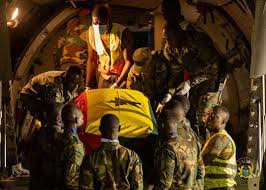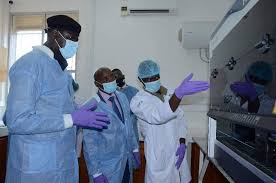Ghana Helicopter Crash DNA Identification In South Africa
Forensic Team Works to Bring Closure After Tragic Helicopter Accident
Remains Of Helicopter Crash Flown To South Africa
Chief Superintendent Edward Abban, who heads Police’s DNA unit, has taken charge of identifying eight victims from the recent Ghana military helicopter crash.

His team acted swiftly to coordinate the operation. Businessman Ibrahim Mahama immediately offered his private jet, Dzata Jet, to transport the remains to South Africa for advanced DNA testing. This quick response enabled forensic work to begin without delay.
International Collaboration Yields Accurate Results
Because Ghana currently lacks advanced DNA analysis equipment, authorities selected South Africa’s high-tech forensic facilities. These labs not only possess superior technology but also employ highly trained experts who deliver faster, more reliable results.

Chief Superintendent Abban, drawing on his extensive forensic experience, personally monitors every step of the process. He ensures both technical accuracy and proper respect for the grieving families.
Swift Response Through Strong Partnerships
Recognizing the urgency, multiple parties sprang into action. Dzata Jet’s immediate availability allowed for prompt transportation, demonstrating how effectively private and public sectors can unite during emergencies.
Currently, Ghanaian officials collaborate closely with three key groups in South Africa: forensic scientists conduct the DNA analysis, military investigators provide crash details, and medical professionals assist with identification. Such international teamwork consistently produces better outcomes in complex cases.
Understanding the DNA Identification Process
Forensic teams first carefully collect DNA samples from the victims’ remains. Next, technicians extract and analyze the genetic material in specialized laboratories. Then, they compare these profiles against DNA samples voluntarily provided by family members.

While most identifications are completed within days, some challenging cases may take longer. However, the team works tirelessly to verify every match beyond doubt.
Supporting Families Through Difficult Times
Families face immense stress awaiting identification results. Once confirmed, they can proceed with funerals, proper grieving, and military honors if needed. Recognizing this burden, the Ghana Police Service has deployed counselors to offer emotional and practical support throughout the process.
Ghana Advances Its Forensic Capabilities
Although Ghana currently depends on foreign labs for complex cases, the country is making significant strides in forensic development. Recently, authorities have acquired state-of-the-art DNA testing equipment and initiated intensive training programs for forensic personnel.

Furthermore, the government has strengthened collaborations with international bodies like Interpol. These strategic moves align with Ghana’s ambitious plan to establish a world-class forensic facility that can independently handle major cases in the coming years.
Investigation Progresses with Clear Next Steps
The impending DNA results will achieve three crucial objectives: First, they will definitively identify all victims. Second, they will provide crash investigators with essential information. Third, they will help determine whether mechanical failure, human error, or other factors caused the accident.
Authorities have guaranteed they will disclose all findings transparently to the public, maintaining trust throughout the investigative process.
Strengthening Ghana’s Emergency Response
This tragedy has highlighted several areas for improvement in Ghana’s disaster management system. Top priorities now include upgrading local forensic capabilities, optimizing emergency response protocols, and expanding training programs for disaster teams.
By focusing on these critical areas, Ghana will gradually reduce its reliance on foreign assistance during crises while enhancing its capacity to manage emergencies effectively.
Conclusion: Leadership in Difficult Times
Chief Superintendent Abban continues to guide the identification process with both professional expertise and genuine compassion. As Ghana awaits the final results, this case powerfully demonstrates how forensic science provides crucial answers during tragedies.

The lessons learned will undoubtedly shape and strengthen Ghana’s emergency response systems for future generations. Through such difficult experiences, the nation builds greater resilience and capability to face challenges ahead.



